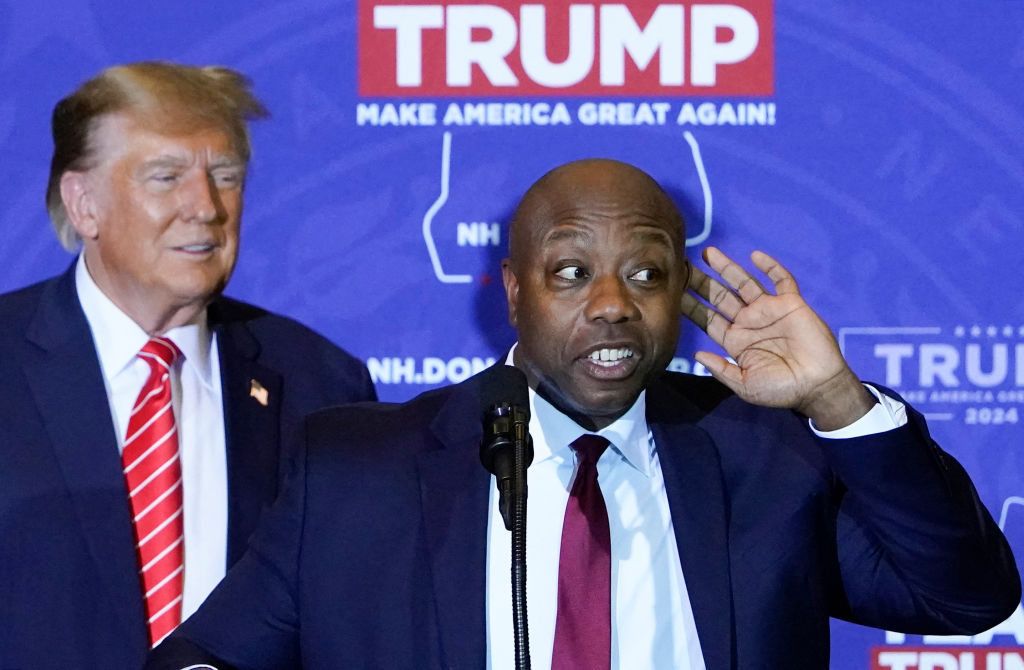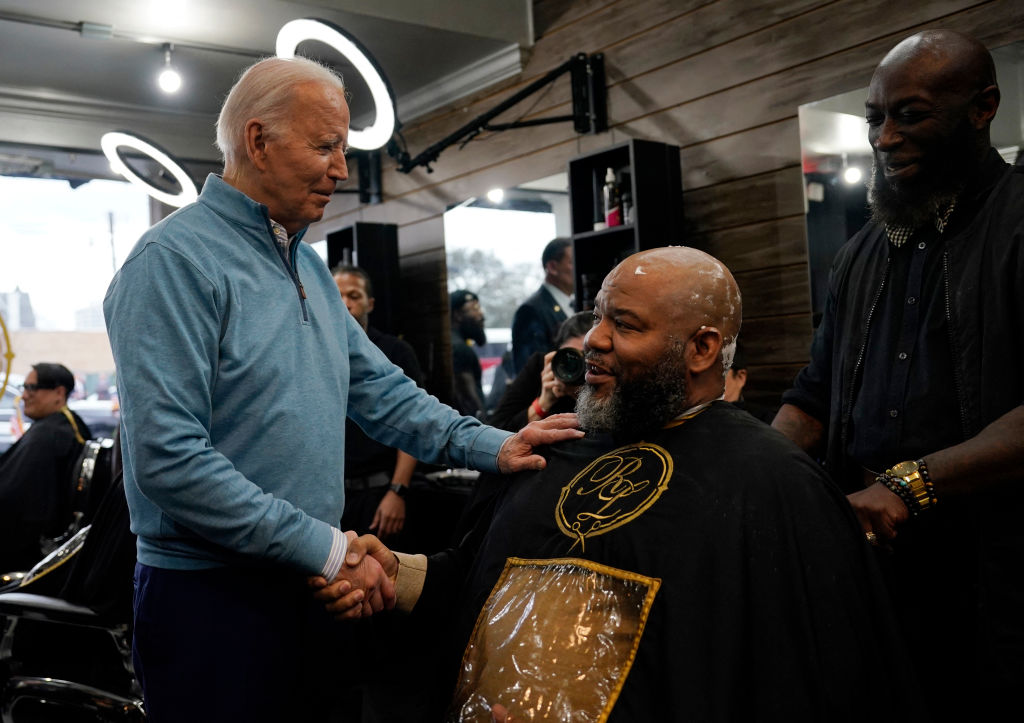
We are told that “polarization” is the “word of the year,” but doesn’t that seem a little preachy?
The practice of picking superlatives or the listing of lists to close out a year is a time-honored practice of lazy journalists looking for a bit of seasonally appropriate fluff. It gets us through the slow news days around Christmas and the New Year, and, especially in an election year, it’s an opportunity to do something a little lighter and less taxing to both the writer and the audience.
As a traditionalist and defender of proven institutions (as well as a lazy journalist) I’m all about it. But if we’re serving fluff, it should be fun fluff.
“Polarization?” Jeez louise, people. Looking back over the 24-year span of Merriam-Webster’s annual word choice, though, preachiness seems to be a common theme. “They” was the word for 2019, “justice” for 2018, “feminism,” for 2017, “democracy” for 2003, etc. The dictionary had a nice two-step for COVID: “pandemic” for 2020 and “vaccine” for 2021, but generally the words have all the lightness and gaiety of a land acknowledgement before a faculty senate meeting. Maybe after 2007’s “w00t,” the word pickers decided that preachy was safer than hip.
But we, gentle readers, always have at least some fun here, since we know that politics is too important to take too seriously. No sermons today. But the other part of the “Our Annual Year” racket is that the fluff has to be in some way an informative retrospective. The goal is for news consumers to say “Oh, yeah!” Ideally, that is followed by the reader, listener, or viewer telling a younger family member something like “the older you get, the faster time goes by,” which provides the younger person an opportunity to exercise the rectus muscles that control eye rolling so they can be in top shape for holiday functions. Public service journalism, you know.
Fun and educational is a good start. But I hear you out there asking yourselves, “But, Chris, what about smoked and/or cured meats?” Great question.
The clear solution is to run a weekly contest all year for readers to submit humorous captions for the photos that appear on each edition of Stirewalt on Politics, choose a weekly winner, pit those weekly winners against each other in a monthly contest with a political memorabilia prize, and then pit those winners against each other for the annual championship and award the winner a delicious Edwards of Virginia Wigwam ham (or smoked turkey equivalent). It’s as simple as it is obvious.
So here we are. After 12 months of diving down eBay rabbit holes to find, among other things, old campaign buttons, antique newspapers, a 1960 football trading card, Arrested Development swag, and a “President Nixon, Now more than ever” branded comb, we have arrived at the swine divine. Today, we will look back at all the monthly winners and announce our second annual grand prize winner.
But before we feast, some housekeeping.
Because of the upcoming holidays, this is the last edition of this note for the year. That means that December’s contest is between last week’s winner and the winning entrant for this week’s contest, based on the following photo of Sen. Lisa Murkowski of Alaska:

The weekly winner was also our champion of the truncated December contest, but could have shone through in any month. Though it deviated from the ideal in that it was an imagined quote instead of a spoof cutline in Associated Press style, the winning submission was packed with detail in relatively few words:
“Whether it sells, who knows? But we’ve gotta do something with the melt-off.”—Bill Ward, St. Augustine Beach, Florida
That makes Mr. Ward a two-time monthly winner this year, a well-deserved distinction, as is his monthly prize, a framed New York Times front page from July 1, 1958, when Dwight Eisenhower signed the bill admitting Alaska to the union. Even better, we already have his address!
Of course it wouldn’t be a weekly contest without our runner-up winners:
Winner, Shrug Emoji Division:
“Sen. Lisa Murkowski recently on her Senate role: ‘Advise, sure. Consent?'”—Linda McKee, DuBois, Pennsylvania
Winner, Simpsonian Division:
“... can it BART, I’m speaking!”—Donnie Bishop, New Castle, Virginia
Winner, Ironed Out Division:
“Sen. Lisa Murkowski practices waffling in front of a live audience.”—Mark Swedberg, Natal, Brazil
Winner, Last Frontier Division:
“I might run, but 1,000 miles is a long way … ”—Dave Carter, Palmer, Alaska
Winner, Clairol Division:
“Does she or doesn’t she? Only her pollster knows for sure.”—Richard Basuk, New York, New York
Winner, Privileged Resolution Division:
“Oh Pete … Does somebody need a hug?”—Allan Hardcastle, Lincoln, California
Now that we’re up to date, we can hit the rewind button again, but this time to go all the way back to January as we begin our year in review.
January

“What’s that? He’s right behind me?”—Daniel Summers, Knoxville, Tennessee
We started 2024 with an ending. The idea that Republicans were ready to move on from Donald Trump ran smack into reality in Iowa, as caucus goers braved a blizzard to offer an emphatic “no” to the idea of an open primary. Trump ran like an incumbent, and would be accordingly hard to unseat. By the time the circus arrived in New Hampshire a week later, the traditional Republicans were falling in line, but none more enthusiastically than South Carolina Sen. Tim Scott. Like Fred Thompson before him, Scott stirred the ardor of movement conservatives, especially in Washington, but found little love in Iowa. His enthusiasm for both backing Trump and attacking his fellow South Carolinian, Nikki Haley, would prove to be a leading indicator for the direction of the GOP.
January’s winner earned the prize for writing perfectly to the image but also making subtle reference to the fear that Trump’s rivals, other than Haley, had for the man they claimed to want to defeat.
February

“Patron shielded from mirror as ‘Take Your President to Work’ campaign goes awry.”—Linda McKee, DuBois, Pennsylvania
While Republicans were trying to figure out if they had the stomach for contested primaries, Democrats were in no way wondering. They wanted no part of a real race for their enfeebled incumbent. But even after President Joe Biden succeeded in getting his party to scrap its traditional calendar to minimize the chances of an early-state embarrassment, there were still lots of warning signs. Indeed, the black voters on whom Biden was relying to protect him from the hard-left white progressives in Iowa and New Hampshire were sending Biden a message that resonated all the way through Election Day.
February’s winner made a joke about Biden’s age and infirmity but without being blunt or cruel. She made the joke about the picture, kept it tight, and followed AP style. 10/10.
March

“Nikki Haley, seen here with what she called a ‘delicious child.’”—Daniel Summers, Knoxville, Tennessee
Haley had grit, that’s for sure. But in the face of a Republican establishment that was a subsidiary of MAGA Inc., her Super Tuesday run looked like it was more about sending a message than winning a nomination. Trump was running as an incumbent, and one with a still-cresting wave of rank-and-file sentiment behind him. But Haley’s consistent support from something like 1 in 5 Republican primary voters suggested that Republican divisions were real, and, potentially, consequential. Much of Vice President Kamala Harris’ eventual campaign was focused on winning these voters over to the Democratic side. While there’s evidence that Harris kept most of the Republicans who had flipped to Biden in 2020, the November results suggest that Democrats didn’t recruit nearly enough new ones to offset GOP gains with working-class voters.
Our March winner had it all: Concision, dark humor, goofiness, and AP style. Perfect score.
April

“It’s what I like to call the Electoral Decolletage.”—Bill Ward, St. Augustine Beach, Florida
The Democrats’ theory of the 2024 electorate depended on the idea that young women, driven in large part by opposition to restrictions on abortion, would overwhelm the party’s enthusiasm gap with Republicans. The results of elections since the fall of Roe v. Wade suggested that Democrats really were on to something. But what they had not counted on was that the GOP would take a hard left turn on issues of life. After decades of credible threats against squishy GOP candidates, pro-lifers found they could not hold Trump to account on the issue. By the time the general election season was underway, Trump had reinvented himself and his party as a pro-choice, moderate affair.
Our April winner walked right up to the line on good taste and got a win for a cutline as daring as Kari Lake’s outfit.
May

“Hampered by ‘outrageous, illegal’ judge’s gag order, Former President Trump must use cunning to communicate with Stormy Daniels”—Bob Goldman, Gilroy, California
After a primary season in which neither party’s frontrunner consented to even a single debate and with the Commission on Presidential Debates spurned by both Republicans and Democrats, it was very much an open question whether 2024 would be the first quadrennial cycle since 1972 without a general election debate. But then, in the span of one day, Trump and Biden agreed (on social media, of course) to two contests. What presumably changed was that Trump, who had been averse to the idea because of his poor showing in 2020, decided that Biden had more to lose. Did he ever …
May’s winner was 2023’s ham champion, and here Mr. Goldman shows his gift for being just a little naughty but still being mostly nice.
June

“Over the ashheaps the giant eyes of Donald J. Trump kept their vigil …”—Cannon Alsbrook, Smyrna, Georgia
The Senate map for 2024 always favored Republicans, with lots of red-state Democrats on the ballot. What was less clear in the first half of the year was whether Republicans would again shoot themselves in the feet with weird, unappealing nominees in key contests. As the primary season was coming to a close in June, it was clear that the GOP would avoid the effulgent beclowning of 2022. But not entirely. While the red team scored good nominees in Pennsylvania, Michigan, Nevada, and Montana there were warning signs in Arizona (Kari Lake) and Ohio (Bernie Moreno, pictured above).
A literary turn with June’s winner, proving that we are more than a contest about dirty jokes and pop culture references. We also passed junior-year English, as Mr. Alsobrook proved.
July

“You can always tell a Milford Man.”—Alex Fordney, Chattanooga, Tennessee
As Republicans gathered for their convention in July, it would have been hard to imagine a more dramatic political storyline than Trump having survived an assassination attempt and then a week later becoming the first presidential candidate since Franklin Roosevelt to be nominated three consecutive times by a major party. But while Republicans were preparing a triumph worthy of an emperor in Milwaukee, Democrats were playing out a drama more suited to one Roman ruler in particular. As I wrote at the time: “Upstaging all that shirt-ripping, testosterone-bathed spectacle was the quietest kind of story: A diminished, isolated president increasingly contemptuous of and held in contempt by his own party made his way home to Delaware, sick with the same virus that caused the pandemic that made his presidency possible.” We’ve been living through a lot of history in this still-young century, but the twin spectacles of Trump rampant and a hobbled Biden being drummed out of the race is a moment that will last in historical memory long after we are gone.
Our July winner pandered to my age and comedic preferences with an Arrested Development gag so perfect that it could not be denied. C’mon!
August

“Some of my best friends are Jewish.”—Peter Schwartz, Auburn, Alabama
The anti-Israel protests of 2023 and early 2024 helped make Pennsylvania Gov. Josh Shapiro a national star. His staunch line against the antisemitism that had infected the protests at Penn, like other elite schools, showed courage and clarity. Nor did it hurt that he was the popular governor of the most important swing state. Which is why it was so odd that Vice President Kamala Harris did him dirty in the hurried selection process of a running mate. Harris did it The Apprentice-style, with a very public drama that ended up with her snubbing Shapiro, and by extension, his many admirers in and out of the state. By considering and then rejecting one of the most prominent Jewish Americans in her party, Harris reinforced the narrative of Democrats being beholden to an anti-Israel fringe. Her first big miss.
Our August winner was perfect, but for the absence of newspaper-style cutline format. But what a great joke. It was a mitzvah.
September

“5 yards, encroachment”—Dave Carter, Palmer, Alaska
Harris’ selection of Minnesota Gov. Tim Walz as her running mate was the safe choice. He was inoffensive to most Democrats and very much beloved by younger progressives for his left turn in office and big dad vibes. A running mate pick is a major opportunity for a candidate to tell voters who they are, and what Harris opted to say with Walz was that she was going to stick to the playbook. I struck a hopeful note that if Harris went on to win, that the benighted primary election system that afflicts our politics might finally be dead. Maybe next time …
Our September winner deserves extra appreciation for a funny entry on a tough picture. Mr. Carter won by not going to the obvious gag of what Walz was saying to Harris, but what his wife, Gwen, was doing with her hands in reference to the main subjects of the picture. There was even a football reference for “Coach.”
October

“Kay, never ask me about my business.”—Tim Maloney, St. Louis, Missouri
One of the early warning signs for Democrats about what awaited them in November was that the gap between their presidential candidate and battleground Senate candidates was evaporating, and not in a good way. I wrote: “It starts to look like Republicans are well within reach of 52, with the chances for a 53rd or 54th seat not inconsiderable.” And they landed smack dab at 53. The verdict of 2024 was that Trump won the lower-propensity persuadable voters, and the good vibes extended down the ballot. Noteworthy, though, is that the amount of ticket splitting went up this year. There were no states that split their Senate and presidential votes in 2016, and just one in 2020. In 2024, Arizona, Nevada, Wisconsin, and Michigan all zig-zagged.
I tried to resist October’s winner because I don’t like to lean too heavily on pop culture references. Our goal here is to avoid inside jokes. But every time I think I’m out, you keep pulling me back in …
November

“Smiles emerge as the Sweet Meteor of Death approaches” —George Spence, Bentonville, Arkansas
If you were looking for a phrase of the year rather than a word of the year, you might pick Harris campaign manager Jen O’Malley Dillon’s line from election night: “Nauseously optimistic.” As the wild and wooly 2024 campaign came to a close there was, dare I say it, peace. There have been some Democrats who tried to delegitimize the results, and even some kooks on the GOP side. But generally there has not been any unrest nor has there been much effort to deny reality. It was, as it turned out, a very normal election. The party of the unpopular president in power was punished by voters in an election substantially litigated around the issues of the economy and immigration. And, despite the hopes of some and fears of others, governing remains very hard. The institutional mortar around the bricks of the republic seems to be holding. The best thing about the election is that it’s over. As I wrote in the final note before the votes were counted: “I love my work, but I think that like a good dose of horseradish, I’ve enjoyed about all of this one that I can stand.”
November’s winner was a very inside politics kind of joke, but was just too perfect to pass up. And we should note here how lucky all of our contestants are to have had such an amazing year’s worth of photos with which to work. Managing Editor Rachael Larimore and her team did most of the hard work for this contest by embracing the goofy spirit of it all and delivering the raw material for great gags week after week.
Thanks also to my cherished American Enterprise Institute colleague, Nate Moore, who kept the whole ham business running, even as he was very busy keeping me up to speed on all the latest election data. Good show.
Let’s Pig Out
Now, onto ham business.
You might have a favorite from the dozen beauties above, but any reader will acknowledge that picking a winner was no easy task. Any one of them would have made a worthy ham champion this year.
But there can be only one, and that one is Linda McKee, the stalwart among stalwarts, and her February entry about Biden’s tonsorial limitations. It was a layered joke with some good political commentary folded in. It was concise. It was in Associated Press style.
Ms. McKee’s entry didn’t need to stand on the shoulders of her years of excellent entries to the contest, but that sure didn’t hurt her chances either. Congratulations to you and yinz people in Western Pennsylvania, Ms. McKee.
We already have your address, but we need to know whether you would like a delicious Wigwam Ham or a beautiful Edwards’ smoked turkey. If it’s swine on which you’d rather dine, please specify if you’d like it cooked or—for serious Virginia ham aficionados only—uncooked and ready for finishing at home. Depending on your order, there will probably be a delay of some weeks before Edwards can resupply its larder after the Christmas assault.
Thank you all for the fun this year and here’s to you and yours for a joyous Christmas (or Christmas equivalent) and the happiest of New Years.
Holy croakano! We welcome your feedback, so please email us with your tips, corrections, reactions, amplifications, etc. at STIREWALTISMS@THEDISPATCH.COM. If you’d like to be considered for publication, please include your real name and hometown. If you don’t want your comments to be made public, please specify.






Please note that we at The Dispatch hold ourselves, our work, and our commenters to a higher standard than other places on the internet. We welcome comments that foster genuine debate or discussion—including comments critical of us or our work—but responses that include ad hominem attacks on fellow Dispatch members or are intended to stoke fear and anger may be moderated.
With your membership, you only have the ability to comment on The Morning Dispatch articles. Consider upgrading to join the conversation everywhere.